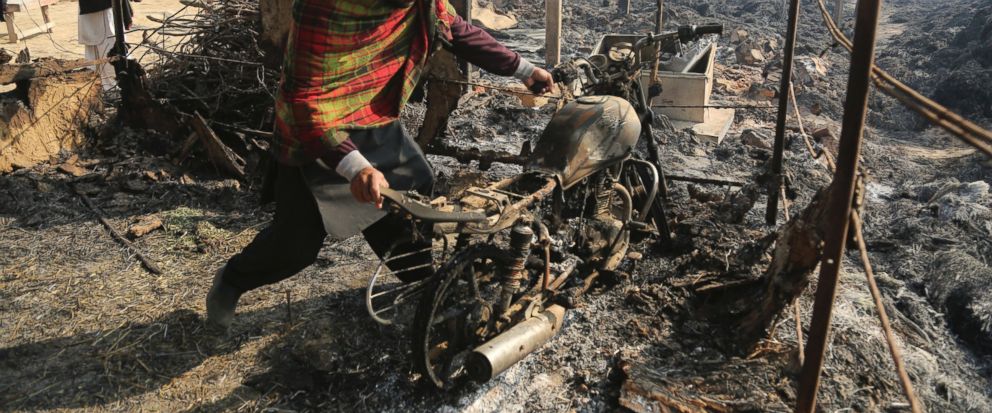India, Pakistan continue trading fire and blame in Kashmir
Indian and Pakistani soldiers again targeted each other's posts and villages along their volatile frontier in disputed Kashmir after a day's lull, killing at least one civilian and wounding three others, officials said Monday.
Fighting erupted overnight as the rivals traded gunfire and shelling until dawn Monday, leaving a civilian dead and three others injured on the Indian side. The two sides resumed intermittent fighting at several places later Monday, officials said.
The recent flare-up has left 13 civilians and nine soldiers dead and dozens injured on the two sides. The fighting also has caused extensive damage and sent tens of thousands of residents fleeing from their border homes.
In Pakistan, two army officials confirmed that skirmishes continued in various parts of Kashmir, causing panic among local villagers, who were moving to safer places. The officials said Pakistan responded to Indian fire only after coming under attack.
The officials spoke on condition of anonymity as they were not authorized to talk to reporters.
Both of the nuclear-armed rivals routinely blame the other for starting any firing and insist they are only retaliating.
As in the past, both also called the violence an unprovoked violation of a 2003 cease-fire agreement and summoned each other's senior diplomats in their capitals to register their anger and protest. They also issued statements condemning the violence.
Officials say the latest violence has sent tens of thousands of villagers fleeing from their homes in hundreds of affected villages along the border to government buildings converted into temporary shelters or to the houses of friends and relatives living in safer places.
Hundreds of houses have been destroyed and bullets and shrapnel have scarred homes and walls on both sides. Hundreds of cattle and livestock have also perished in the confrontation.
Indian civilian official Arun Manhas said an entire village along the frontier was destroyed in a fire caused by the shelling. He said over 100 cattle were killed in the village.
"Damage to the huts and cattle is huge in the village. It was a daunting task to shift over 4,000 cows and buffaloes from the village along with about 1,200 residents who are mainly milk suppliers for the vast area," Manhas said.
Most of the fighting is taking place along the portion of the frontier which is somewhat-defined and where each country has a paramilitary border force guarding the lower-altitude 200-kilometer (125-mile) boundary separating Indian-controlled Kashmir and the Pakistani province of Punjab.
But the fighting has also escalated to the contentious frontier that includes a 740-kilometer (460-mile) rugged and mountainous stretch called the Line of Control that is guarded by the armies of India and Pakistan and splits Kashmir between the two nations.
Also Monday, Pakistan's powerful army chief, Gen. Qamar Javed Bajwa, visited the border villages of Khuiratta and Ratta Arayan, where he was briefed on "Indian cease-fire violations" which resulted into civilian and troop casualties, according to a military statement.
It said Bajwa praised Pakistani troops for responding to the Indian fire.
The statement quoted Bajwa as saying that Indian troops were unethically targeting the civilian population, and he directed the army to construct bunkers for civilians.
Meanwhile, Kashmiri separatists who challenge India's sovereignty over Kashmir called on both India and Pakistan to demonstrate "restraint and wisdom."
Top separatist leader Syed Ali Geelani said the two countries should "play a constructive role for peaceful resolution of the Kashmir issue."
"The risk of collision between the two nuclear powers will be devastating not only for the region, but for the whole world," he said.
India and Pakistan have fought two of their three wars since 1947 over their competing claims to the region. Since 1947, they have each administered part of it.
Many see the fighting as part of what's become a predictable cycle of violence, as the region convulses with decades-old animosities between India and Pakistan over Kashmir, where rebel groups demand that the territory be united either under Pakistani rule or as an independent country.
A flare-up last year similarly sent thousands to temporary shelters for days.
India accuses Pakistan of arming and training anti-India rebels and also helping them by providing gunfire as cover for incursions into the Indian side.
Pakistan staunchly denies this, saying it offers only moral and diplomatic support to the militants and to Kashmiris who oppose Indian rule. Nearly 70,000 people have been killed in the uprising and the ensuing Indian military crackdown since 1989.
———
Associated Press writer Munir Ahmed in Islamabad, Pakistan contributed to this story.
- Star
Add Interests Customize your news feed by choosing the topics that interest you.
To save your interests across all devices Log In or Sign Up »Source – abcnews.go.com

